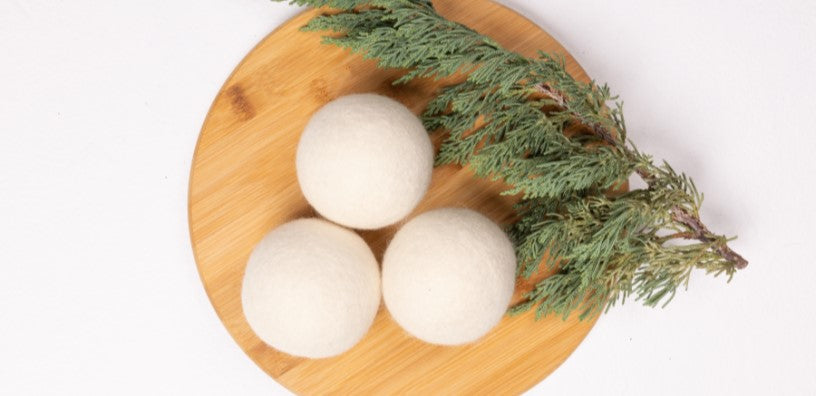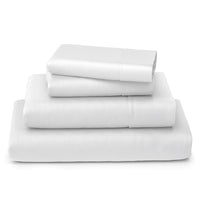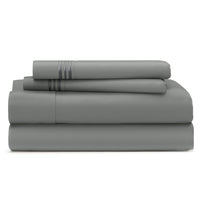
You Should Skip Fabric Softeners and Dryer Sheets: Find Out Why
Fabric softeners and dryer sheets are two of the most common laundry products on the market. But did you know that they can actually be harmful to your clothes, your health, and the environment?
Keep reading to learn why it may be time to ditch these laundry items…

We don’t love them for your clothes
They can build up residue on your clothes. Fabric softeners and dryer sheets leave behind a film of chemicals that can coat your clothes and make them less absorbent. This can lead to clothes that take longer to dry and that are more likely to develop static cling.
Not to mention these same chemicals can even make your clothes weaker and more susceptible to damage—pilling, tearing, and fading. And who wants that?

We don’t love them for your skin
They can irritate your skin. Because they can contain artificial fragrances, dyes, surfactants, and other chemicals like formaldehyde or phthalates, if you have sensitive skin or allergies, you are susceptible to irritation, redness, itching, and even rashes from these cleaning products. [6,7,8]
Even though they’re advertised as “softening,” dryer sheets and fabric softeners are the polar opposite when it comes to your sensitive skin. The chemicals in these products can dry out skin, making it more prone to irritation. A little ironic!

We don’t love them for the planet
They're bad for the environment. Fabric softeners and dryer sheets are made with petroleum-based products, which are non-renewable and can pollute the environment. What kind of chemicals, you ask? When fabric softeners and dryer sheets are heated in the dryer, they release volatile organic compounds (VOCs) into the air. VOCs are known to cause respiratory problems, headaches, and nausea. They can also contribute to smog and other forms of air pollution.[1,2,3,4]
Did you know that the average American household washes about 300 loads of laundry per year?[5] When you factor in that most dryer sheet manufacturers suggest using up to two dryer sheets per load, that’s a whole lot of chemicals being released into the environment! And when those chemicals land in our waterways, they can harm fish and other wildlife.

So, what do we love?
We don't like icky chemicals, itchy skin, or harming the planet. What we do love is natural alternatives that are friendly to your wallet, your skin, your home, and your earth. We love wool dryer balls, to be specific. If you’re looking for a mindful way to soften your clothes and reduce static cling, wool dryer balls are just the thing.
Need more convincing? Read on.
We love a happy home
Wool dryer balls are kind to your skin, clothes, and your wallet!
- They are made from 100% natural sheep’s wool, so they are hypoallergenic and safe for people with sensitive skin.
- They are reusable, so you can save money and reduce waste by not having to buy disposable dryer sheets.
- They help to reduce static cling, so your clothes will be wrinkle-free and soft to the touch.
- They can help to freshen your fabrics by absorbing odors.
We love a happy planet
Wool dryer balls are kind to the planet!
- They are reusable, biodegradable, and can last for up to 1,000 loads of laundry.
- They help to reduce drying time by 30%, which saves energy and reduces your carbon footprint.
- They are free of dyes, chemicals, and harmful fragrances that would otherwise be released into the atmosphere.
- They are sourced from humanely sheared New Zealand sheep and hand-felted for minimal processing.
Suggested Read: If you’re looking for a deep dive into everything wool dryer balls, then you need to check out this blog right here.
We love All Natural Wool Dryer Balls

Ready to make the switch?
Cosy House Collection’s extra-large Wool Dryer Balls are the best way to soften and freshen your laundry. Synthetic, single-use dryer sheets and fabric softeners are wasteful, can decrease the longevity of your dryer, and can potentially affect your health.
Our wool dryer balls are the perfect mindful alternative because they’re crafted with humanely sheared sheep’s wool, without any additives or harmful chemicals. And they’re reusable, so no unnecessary waste! What’s even better is that they last for up to 3 years! This means no more having to run to the store when you’re low on dryer sheets or fabric softeners.
Cosy Pro Tip: If you're looking for a fun way to use your new Cosy House Wool Dryer Balls, try adding a few drops of essential oil to them before you put them in the dryer. The heat from the dryer will diffuse the essential oil and your clothes will smell amazing!
We are dedicated to providing you with safe, effective products that are kind to your skin and the planet. A happy, healthy home and being mindful go hand-in-hand!
But don’t take our word for how great our Wool Dryer Balls are… thousands of people love them! Find out why:
--
“These dryer balls work great! We have an older dryer and clothes were always coming out with damp spots, static, and wrinkles. Not any more! These dryer balls help to get your clothes evenly dried, remove static - and no more wrinkles! No more buying dryer sheets loaded with nasty chemicals!” - Carol M.
“I use this in my dryer in order to reduce environmental damage from other products like dryer sheets. These wool dryer balls work well, the clothes come out smelling fresh with no static build-up. I highly recommend these!” - Harry V.
“Everything positive that has and is being written about these Dryer Balls is absolutely TRUE and I will never go back to dryer sheets, I'm Hooked! My clothes are softer, they dry much faster and they are extremely cost effective. Thanks so much for this product. I gave them as gifts last Christmas! I will continue to purchase these from Cosy House.” - Karen
--
Suggested Read: Need some tips and tricks for freshening your laundry loads naturally? Check out our top 5 favorite ways to do just that, right here.
To learn more about our Wool Dryer Balls and to order your own set from the Cosy House Collection, visit our shop today by clicking here. We have something for everyone—from luxe bedding to home good essentials, Cosy House offers you all sorts of goodies for your coziest home.
We've gone ahead & enclosed a 10% off coupon below for you to use if you'd like to take the plunge and try out our sheets for yourself! To shop our collection & get 10% OFF Use the code 'BLOG10' at checkout.
Resources:
- Kessler R. (2011). Dryer vents: an overlooked source of pollution? Environmental health perspectives, 119(11), A474–A475. https://doi.org/10.1289/ehp.119-a474a
- Steinemann A. (2016). Health and societal effects from exposure to fragranced consumer products. Preventive medicine reports, 5, 45–47. https://doi.org/10.1016/j.pmedr.2016.11.011
- Steinemann, A.C., Gallagher, L.G., Davis, A.L. et al. Chemical emissions from residential dryer vents during the use of fragranced laundry products. Air Qual Atmos Health 6, 151–156 (2013). https://doi.org/10.1007/s11869-011-0156-1
- Zhang, C., Cui, F., Zeng, G.-ming, Jiang, M., Yang, Z.-zhu, Yu, Z.-gang, Zhu, M.-ying, & Shen, L.-qing. (2015). Quaternary ammonium compounds (qacs): A review on occurrence, fate, and toxicity in the environment. Science of The Total Environment, 518-519, 352–362. https://doi.org/10.1016/j.scitotenv.2015.03.007
- U.S. Department of the Interior. (n.d.). Laundry practices and water conservation (U.S. National Park Service). National Parks Service. https://www.nps.gov/articles/laundry.htm
- Bridges, B. (2002), Fragrance: emerging health and environmental concerns. Flavour Fragr. J., 17: 361-371. https://doi.org/10.1002/ffj.1106
- Ivanyi, N. (2018, February 14). The hidden dangers of dryer sheets - envision skin care center: Poreinfusion acne care products. Envision Skin Care Center | PoreInfusion Acne Care Products - Clear skin you’ve always dreamed of. https://envisionacnecenter.com/hidden-dangers-dryer-sheets/
- Flyvholm MA, Menné T. Allergic contact dermatitis from formaldehyde. A case study focussing on sources of formaldehyde exposure. Contact Dermatitis. 1992 Jul;27(1):27-36. doi: 10.1111/j.1600-0536.1992.tb05194.x. PMID: 1424588. https://pubmed.ncbi.nlm.nih.gov/1424588/



